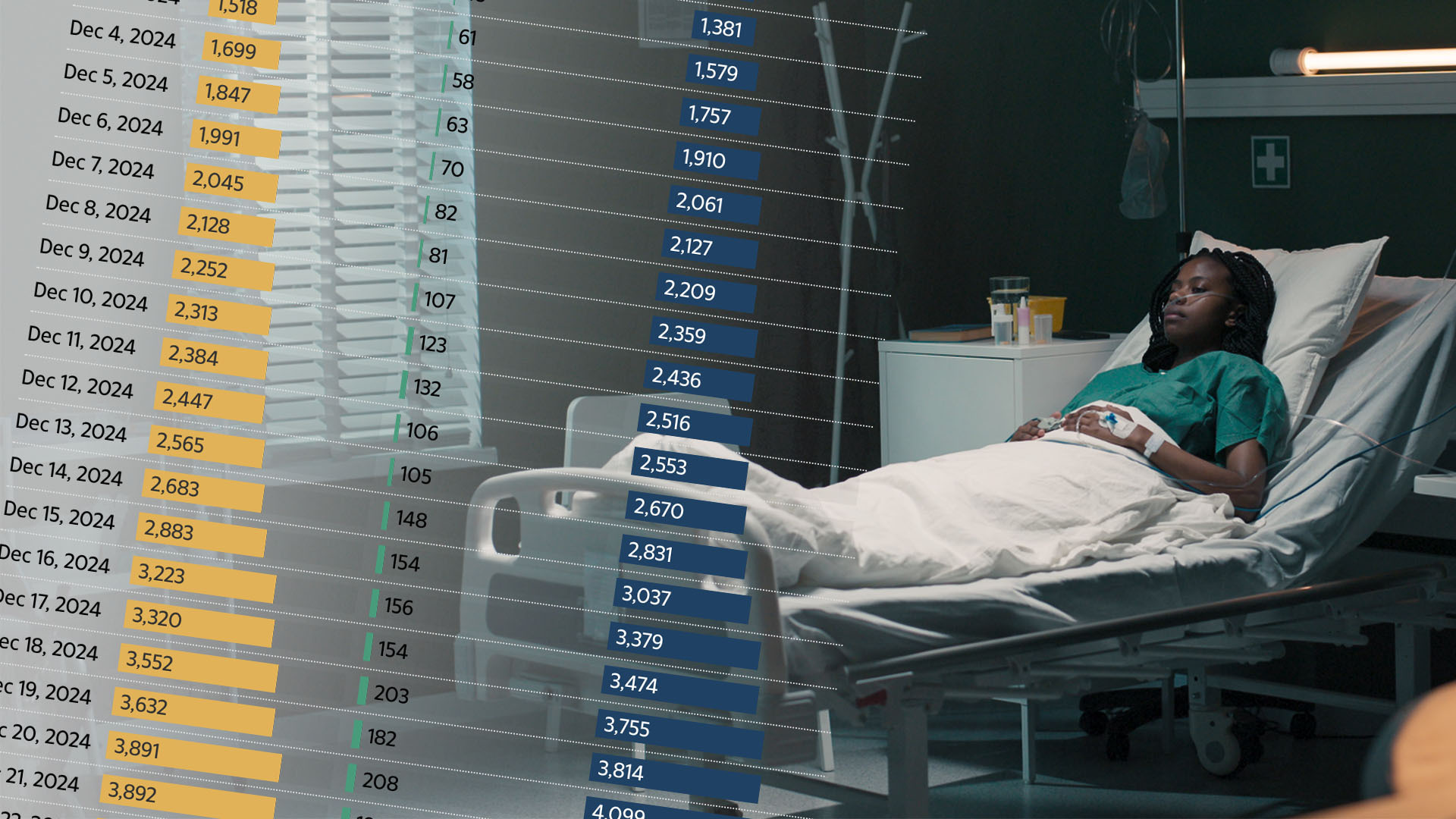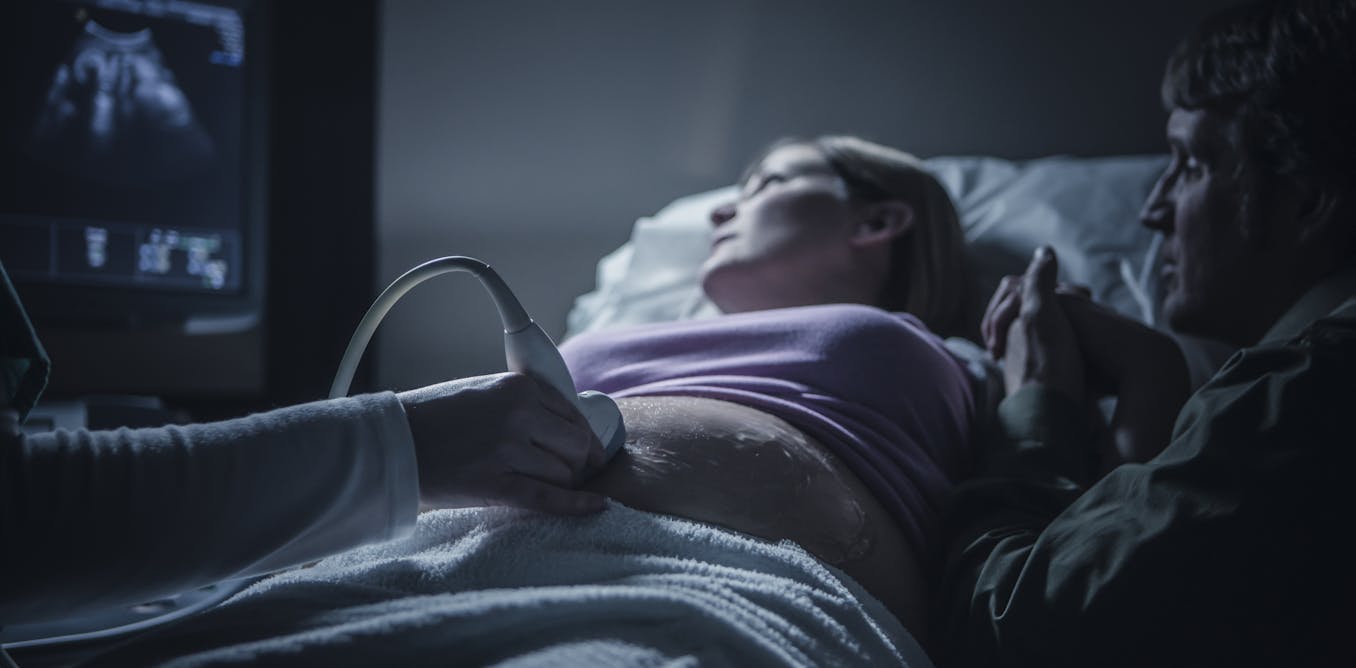FLU is “skyrocketing” after the festive period, health chiefs say, with hospital patients quadrupling in one month.
There are more than 5,000 patients hospitalised with the virus, the most recent data published today showed, and almost a third of Brits with a cough or cold have tested positive for flu.
1
Health chiefs have warned this is on track to be one of the worst winters ever with the severe weather warnings expected to make more people sick.
Professor Julian Redhead, emergency care director for NHS England, said cases were rising at “a very concerning rate”.
Figures show there were 5,074 people in hospital with flu in England on December 29 – four times the 1,190 on November 29.
It also means the number of people in bed with flu in the week to December 29 is almost three and a half times higher than the same week last year.
There were an average of 4,469 patients with flu in hospital each day last week, according to data published by NHS England.
The 4,102 patients in hospital with flu on Christmas Day rose sharply by almost a quarter to 5,074 by December 29.
Professor Julian Redhead, NHS national clinical director for urgent and emergency care, said: “These latest figures show the pressure from flu was nowhere near letting up before we headed into the New Year, skyrocketing to over 5,000 cases a day in hospital as of the end of last week and rising at a very concerning rate.”
It comes after NHS staff rushed to free up beds in anticipation of a tidal wave of winter viruses during the festive period, requesting people pick up relatives as quick as possible.
There was a major push from NHS staff to discharge who no longer needed to be in hospital with 15,000 patients discharged on Christmas Eve – up more than 40 per cent on the 10,500 for the week before.
Meanwhile, the latest figures from the UK Health Security Agency (UKHSA) on cases show that flu “was circulating at high levels”.
Some 29.5 per cent of tests done on Brits of all ages with coughs and colds tested positive for flu.
Professor Susan Hopkins, Chief Medical Advisor at the UK Health Security Agency, said: “For many of us, the festive period is marked with parties and socialising with friends and family, meaning it’s not unusual to see an increase in flu at this time of year and this was anticipated.
“This is why we have been urging those eligible to take up a free flu vaccine.”
But the national booking system for flu and Covid jabs ended just before Christmas.
Eligible Brits can still get vital protection from the two illnesses by visiting a Covid-19 walk-in vaccination site or finding a pharmacy offering the flu vaccine.
Winter storm of health worries
Flu isn’t the only virus buffeting hospitals, as facilities face as onslaught of patients with norovirus and respiratory syncytial virus (RSV).
The NHS reported an average of 723 patients ended up in hospital with norovirus in the week ending December 22. This dipped to 528 patients a day last week.
Although this has come down, it remains 40 per cent higher than 378 the same week last year.
There was also an average of 74 children with RSV in hospital every day last week compared with 50 for the same period in 2023.
Covid continues to plague Brits, with an average of 1,184 beds occupied by patients with the virus.
However, according to UKHSA figures, the positivity rate for Covid and RSV has decreased in the most recent week.
The NHS warnings come as the UK faces plummeting temperatures, with the UK Health Security Agency (UKHSA) issuing cold weather health alerts and predicting additional demand for health services from vulnerable Brits.
Further figures show the pressure on urgent and emergency services with a total of 98,118 ambulance handovers to hospitals last week, and 465,442 calls received by NHS 111.
Anticipating pressure on hospitals from winter viruses the NHS put in place measures to manage demand, including making 1,301 more beds available last week compared to the same period last year (101,309 vs 100,008).
An average of 648 more beds occupied each day compared to last year (90,200 vs 89,552).
Prof Redhead said: “On top of flu there is also continual pressure from Covid, while RSV and norovirus hospital cases are also higher than last year, with hospitals putting in place an extra 1,300 beds last week than the same time last year in expectation of this continued pressure from viruses and other demand.
“With what looks like an extreme cold snap expected right across England ahead of the weekend, we know the low temperatures can be dangerous for those who are vulnerable or have respiratory conditions so if you are at risk, do try and keep warm and make sure you are stocked up on any regular medication.
“Please continue to use NHS 111 and 111 online if you need advice and support for health conditions, and only use 999 or attend A&E in life-threatening emergencies.”
A number of major hospitals declared critical incidents over the festive period, with photographs showing 22 ambulances lining up outside of Gloucestershire Royal Hospital.
They pleaded with patients to only go to A&E for genuine health emergencies and use other health services instead.
Commenting on the flu statistics today, Dr Adrian Boyle, President of The Royal College of Emergency Medicine (RCEM), said: “Emergency Medicine staff are resigned to a severe increase in pressure over the winter period, however this year the increase in flu cases has heaped even more pressure on already overstretched departments.
“What this will mean in real terms is an increase in A&E waiting times and an increase in avoidable deaths.”
“We have a system that is chronically overwhelmed.”
How can I protect myself?
Getting jabbed is one of the best ways to protect against these winter viruses.
The NHS is pleading with Brits to get vaccinated as cases and hospital admissions rise.
Flu, Covid and RSV vaccines are free to those who meet NHS eligibility criteria.
Adults aged 65 and over, care home residents and people aged six months to 64 years with specific underlying health conditions are all eligible for free Covid and flu jabs on the NHS.
Those not eligible for free vaccines can purchase one from their local chemist. There is some evidence to suggest wearing a face mask can protect you from catching the bugs.
An RSV vaccination programme has recently been deployed by the NHS. As of November 2024. More than one million have received an RSV vaccination.
The jab is available to those considered most vulnerable: older adults aged 75 to 79 and pregnant women.
Those not eligible can purchase a single dose of RSV vaccine from the pharmacy chain Boots for £245.
At this time there are no vaccines for norovirus – though some are in development.
So the best way to protect yourself from norovirus is to properly sanitise your hands, cover your mouth and nose when you cough and sneeze, dispose of tissues, let fresh air circulate and stay home if you’re unwell.
Delays in the rollout of the RSV vaccine may also mean some vulnerable people received it too late this year to be protected.




